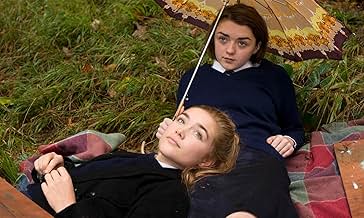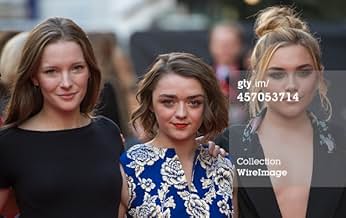È il 1969 in una rigorosa scuola femminile inglese dove Abbie e Lydia sono migliori amiche. C'è una tragedia in primo luogo, una misteriosa epidemia della malattia che causa la stabilità di ... Leggi tuttoÈ il 1969 in una rigorosa scuola femminile inglese dove Abbie e Lydia sono migliori amiche. C'è una tragedia in primo luogo, una misteriosa epidemia della malattia che causa la stabilità di tutti e dei soggetti coinvolti.È il 1969 in una rigorosa scuola femminile inglese dove Abbie e Lydia sono migliori amiche. C'è una tragedia in primo luogo, una misteriosa epidemia della malattia che causa la stabilità di tutti e dei soggetti coinvolti.
- Regia
- Sceneggiatura
- Star
- Premi
- 3 vittorie e 5 candidature totali
- Titch
- (as Rose Caton)
Recensioni in evidenza
Alas this film, which I thought would match this from the reviews I read, did not come anywhere near it. Whereas this was certainly a personal project to writer / director, to everyone else it really is a non-sensical load of tosh. Neither eerie, classy, engaging or atmospheric.
The school group was similar to "Picnic" i.e. pretty centre of attention girl, mixed up clever girl down to fat eat a lot girl...pretty stereotypical characters.
When the fainting/shaking actually occurs, especially in the school assembly scene I'm afraid it became comical. They were obviously well drilled on how to faint.
The Director did try to convey a sense of nature at work here. For example, intimating that Abbie's spirit lingered among the old oak tree, straight through to hearing fox cries, owls hooting, even in the scenes shot in Lydia's house! Needless to say the (step)brother and (step)sister "getting it on" scenes were pretty uncomfortable. On that point was not convinced on the Mother character, especially the acting.
Major plus however, Florence Pugh, she is going to go far. A great looking girl with a distinctive voice and she can sing play guitar.
Set in a 1969 girls school, when the promiscuous student Abbie, played by Florence Pugh, accidentally gets pregnant, she begins to suffer from fits of fainting seemingly at random. Her best friend Lydia, played by Williams, deals with the consequences after the epidemic spreads across the school with girls fainting out of control. The film appears to be a story about the friendship between Lydia and Abbie, but it fractures off into different directions, some more engaging than others. Most dramatically is exploration into Lydia's past, or rather, how she came into this world. Her relationship with her agoraphobic mother, played by Maxine Peake, is a key aspect of the film and one of the few things that eventually pay off in a satisfying way, if a disturbing one. It needed some more development beforehand to feel fully fleshed out, but the delivery of it in the third act is the film's greatest strength.
While kept deliberately ambiguous, it appears that the fainting is somewhat of a punishment for early sexual behaviour (which incidentally appears to mostly be instigated by Lydia's brother, played by Joe Cole). There's no charm in its apparent disdain and shaming for the young girls' urges and it doesn't feel like a thought thoroughly argued through enough. It's most interesting for the way the authority figures react, which is in complete denial that anything is wrong, even when Lydia is on her knees in the hallway. Even so, characters don't react the way people would react to others fainting, though perhaps it's supposed to hint about how it's become so tiresome. It contributes to the uneasy atmosphere of the film with its dreamlike eeriness.
It is quite rewarding to see Maisie Williams in this type of environment for a change. It's clear that she's making the most of it and trying her best to feel natural, but she doesn't quite have the conviction to make it work just yet. In time she'll be a great actress. It just feels as though Morley has misjudged what the film was trying to do for the most part, thematically and tonally. It does have some good aspects and interesting tidbits, existentialism that's valid if unremarkable, but as a whole it brings nothing new stylistically to the table and is often too uninspired in execution. It has a bizarre sense of humour that doesn't quite gel with its thoughtfulness and mystery. Solid production for the budget, interesting and engaging moments here and there, but The Falling is misguided from the script's initial intentions direction.
6/10
Read more @ The Awards Circuit (http://www.awardscircuit.com/)
Unfortunately, the storyline of THE FALLING is all over the place. For the first half hour it's a typical tale of teenage angst and friendship. Things take a darker turn with the introduction of incestuous sub-plots and the like, but then they become ridiculous with the well-choreographed fainting spells. Subliminal imagery abounds, alongside some hinted-at supernatural aspects, but it all adds up to far less than the sum of its components. What's the message here, anyway? What's it all about?
I previously saw director Carol Morley's docu-drama DREAMS OF A LIFE and that was a similar film in that it had an interesting premise but sub-standard execution. Plus, Morley doesn't seem to be very assured at getting good performances out of her actors, and the acting is of a distinctly wishy-washy standard here. I love Maisie Williams in GAME OF THRONES, but she seems unsure of herself here and sometimes just feels like Arya in a school uniform.
Lo sapevi?
- QuizAccording to Maisie Williams, director Carol Morley instructed Maxine Peake (Eileen Lamont) to not communicate with Williams (Lydia Lamont) and to keep her distance from her, in order to replicate the lack of relationship between their characters. Morley did not tell Williams about this, which left Williams feeling disliked and upset throughout the shoot due to the way Peake was ignoring her. Williams eventually found out about it during the wrap party after shooting had ended, when Peake told her about Morley's instructions and apologized for any upset caused.
- Blooper(at around 21 mins) Abbie is stirring her pudding with her left hand. When the camera angle changes, the spoon is in her right hand and her left hand is up under her chin.
- Citazioni
Lydia Lamont: I resent this idea that we're just emotional. This is real.
Psychiatrist: It's real, it has consequences, yes. What's important here is that it's real to you.
Lydia Lamont: Real to me, what does that mean? It's real to all of us. Something's seriously wrong. Why is everyone ignoring us?
- Curiosità sui creditiDisclaimer near the end of the credits: "Although this film was inspired by a variety of real episodes of mass psychogenic illnesses, the narrative is entirely fictional."
- ConnessioniFeatured in Film '72: Episodio #44.3 (2015)
I più visti
- How long is The Falling?Powered by Alexa
Dettagli
- Data di uscita
- Paese di origine
- Lingua
- Celebre anche come
- Падіння
- Luoghi delle riprese
- Aziende produttrici
- Vedi altri crediti dell’azienda su IMDbPro
Botteghino
- Budget
- 750.000 £ (previsto)
- Lordo in tutto il mondo
- 569.498 USD
- Tempo di esecuzione1 ora 42 minuti
- Colore
- Proporzioni
- 1.85 : 1
Contribuisci a questa pagina


































